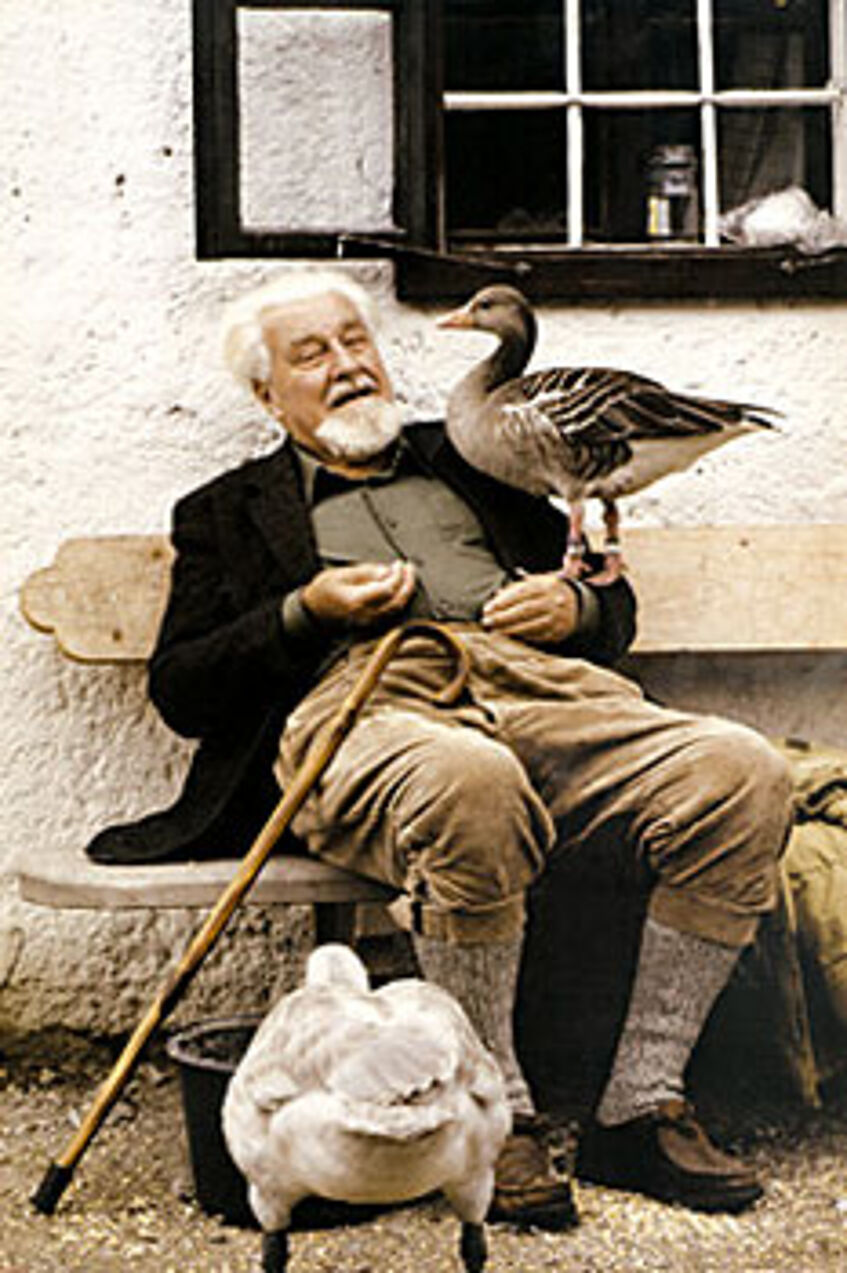Konrad Lorenz
 Konrad Zacharias Lorenz grew up as the younger son of Adolf and Emma Lorenz in Altenberg near Vienna. During his medical studies at the University of Vienna, he was already working on comparative anatomy. He began to keep various animals at home in Altenberg and to keep diaries about his observations of these animals. After earning his doctorate in medicine (1928), Lorenz studied zoology. Here, he was less interested in morphological research (which was predominant at the time) but became more interested in research on the behavior and cognition of animals (which did not exist at the university at the time). He was influenced and supported by renowned Viennese psychologists (Karl Bühler, Egon Brunswick) and German ornithologists (Oskar Heinroth, Erwin Stresemann). Most of his conceptual goes go back to this early phase of his work. After his doctorate (1931), he carried out his new integrative studies between anatomy, zoology, and psychology, first at the II. Anatomical Institute as an assistant to his sponsor Ferdinand Hochstätter, from 1935 unpaid at the II. Zoological Institute and in his private research station in Altenberg. After his habilitation (1937), Lorenz taught as a private lecturer at the University of Vienna (until 1940), but he was denied long-term employment in Austria.
Konrad Zacharias Lorenz grew up as the younger son of Adolf and Emma Lorenz in Altenberg near Vienna. During his medical studies at the University of Vienna, he was already working on comparative anatomy. He began to keep various animals at home in Altenberg and to keep diaries about his observations of these animals. After earning his doctorate in medicine (1928), Lorenz studied zoology. Here, he was less interested in morphological research (which was predominant at the time) but became more interested in research on the behavior and cognition of animals (which did not exist at the university at the time). He was influenced and supported by renowned Viennese psychologists (Karl Bühler, Egon Brunswick) and German ornithologists (Oskar Heinroth, Erwin Stresemann). Most of his conceptual goes go back to this early phase of his work. After his doctorate (1931), he carried out his new integrative studies between anatomy, zoology, and psychology, first at the II. Anatomical Institute as an assistant to his sponsor Ferdinand Hochstätter, from 1935 unpaid at the II. Zoological Institute and in his private research station in Altenberg. After his habilitation (1937), Lorenz taught as a private lecturer at the University of Vienna (until 1940), but he was denied long-term employment in Austria.
With the annexation of Austria to the German Reich (1938), Lorenz hoped for better career opportunities. In the same year he applied to join the NSDAP, which ultimately enabled him to take up a full professorship in psychology at the University of Königsberg in East Prussia (1940). During this period, he also wrote two articles on domestication phenomena, which were in line with the spirit of the times and in which he used terminology that suited the Nazi regime. One year later, however, he was drafted into the Wehrmacht and another three years later he was taken prisoner of war by the Soviets (1944-1948). Here, he wrote the main features of his epistemological works (partly on old paper sacks).
After his return to Austria, Lorenz immediately began setting up research structures. As a ‘less burdened’ he was allowed to teach again at the University of Vienna. The following year he accepted the offer of the Max Planck Society to take over the management of a newly founded research center for comparative behavioral research in Buldern (1950-1957). Later he became co-founder and director at the Max Planck Institute for Behavioral Physiology in Seewiesen (1961-1973). After his retirement, Lorenz moved his graylag geese to the research station, which he founded, in Grünau im Almtal. The research station was supported by the Austrian Academy of Sciences (1973-1989) until his death and since then by a support association in addition to the University of Vienna. He also initiated regular discussion rounds in Altenberg, in which he developed the evolutionary epistemology together with his childhood friend Karl Popper and Rupert Riedl, which is considered the cornerstone of the Konrad Lorenz Institute for Evolutionary and Cognitive Research. In the last two decades of his life, Lorenz increasingly campaigned for environmental protection and nature conservation. He was a prominent advocate against the commissioning of an Austrian nuclear power plant and the construction of a hydroelectric power plant in the Hainburger Au. Konrad Lorenz died in Altenberg on February 27, 1989.
Text based on https://geschichte.univie.ac.at/de/Personen/konrad-lorenz